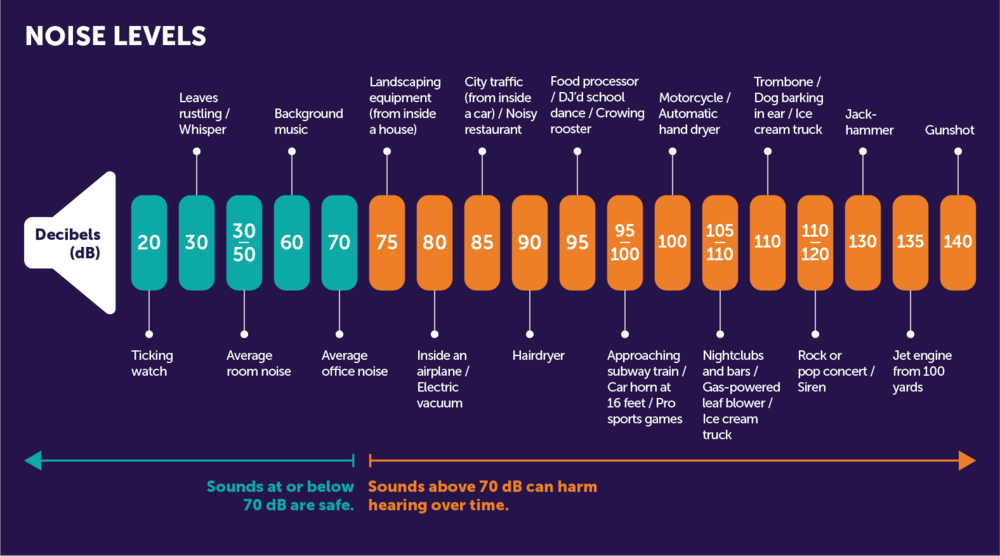Acoustic neuroma - Causes, symptoms & treatment
Comprehensive information on acoustic neuroma ✔ Clear overview of diagnosis, symptoms & therapy ✔ Free consultations at (786) 526-0602....
Read more
From sounds as quiet as a whisper to those as thundering as a jet plane engine, we all experience “noise” as a normal part of our daily lives. But not all sounds are created equal. Some are friendly to our ears, while others can cause hearing loss in a matter of minutes.
The more exposure you have to unsafe levels of noise throughout your life, the more likely you are to experience hearing loss as you age. So, how do you know if a noise level is unsafe? It’s really all about the decibels.
A decibel (dB) is the measurement for sound. The decibel scale shows a range of sounds and the corresponding decibels. Knowing what decibel level is harmful can help you protect your hearing each and every day.
Safe decibel levels are those that fall at or below 70 dB. That includes things like whispers (30 dB), refrigerators (40 dB), and normal conversation (60 dB).
Unsafe decibel levels of sound are those that measure above 70dB. Noise-induced hearing loss can occur overtime from frequent exposure to loud noises, including common tools and products like landscaping equipment (75 dB), food processors (95 dB), and motorcycles (100 dB). And sounds at or over 120 dB (think fireworks and jackhammers) can do some serious damage, quickly.
This decibel chart shows the normal sounds you may experience every day, along with their dB levels.
 Range of noise levels.
Range of noise levels.
Decibels can be measured using a sound level meter, which you can now find as a smartphone app. Using this app from CDC’s National Institute for Occupational Safety and Health, you can measure the sounds around you to determine if they’re safe or if your hearing is at risk. Remember, anything above 70 dB can cause damage.
If you are exposed to loud noise, there are ways to protect your ears. First, put distance between yourself and the noise. Using ear plugs, noise cancelling headphones, or other ear protection can help protect your ears, too, especially if you work in or find yourself around noisy environments.
If you think you have hearing loss, It’s important to have your hearing checked as soon as you can. Treating hearing loss early may stop it from getting worse and can help you protect the hearing you have left. It will also keep you in the conversation and active for years to come.
Hear.com is one of the top names in hearing care, known for putting the customer first. With more than 100,000 happy customers across the U.S., we’re honored to be the No. 1 choice for modern hearing aids. With us, you’ll receive nothing less than best–in-class care, top hearing professionals, and the most modern technology to ensure you hear your best, always.
Reach out to hear.com for guidance and a referral to one of our top hearing specialists today. A hearing test can help determine if you have mild, moderate, severe, or profound loss and allow the hearing care specialist to recommend the right hearing aids for your individual needs.
Right now, you can try out some of our best hearing aids at no risk for 45 days to see how they improve your everyday life. Don’t delay. Join now to start protecting your hearing today — and for tomorrow.
Related Articles
Comprehensive information on acoustic neuroma ✔ Clear overview of diagnosis, symptoms & therapy ✔ Free consultations at (786) 526-0602....
Read more
Are you suffering from hearing loss? You’re not alone! Hearing loss can affect people of all ages, but is most prevalent in adults, affecting 1 out of 3 people over the age of 65....
Read more
Alcohol and hearing loss – what you need to know. The negative effects of hearing loss and alcohol discussed here....
Read more

Take our free 2-minute question-based hearing test!
It will help you make an informed decision on treating your hearing loss.